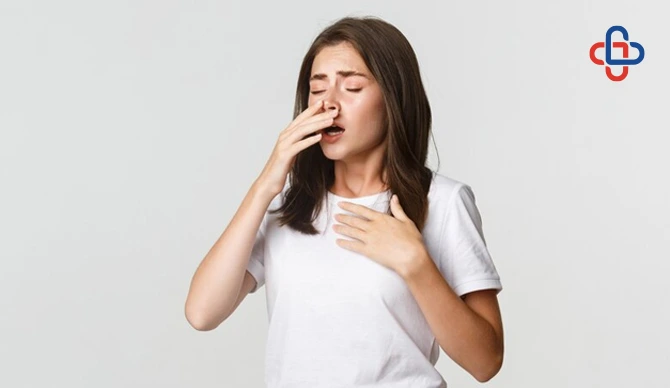Have you ever wondered about the sensation that comes with a sneeze? That split second where your body seems to pause, caught in a brief moment of involuntary action?
You’ve also probably heard about the sneeze heart attack, where your heart stops when you sneeze. But is there any truth to this claim?
Let’s discover the world of sneezes and their connection to your heart.
Table of contents
What is a Sneeze?
A sneeze is a reflexive, forceful expulsion of air from the lungs through the nose and mouth. It’s typically triggered by irritation in the nasal passages, whether from dust, allergens, or viruses.
Does Your Heart Stop When You Sneeze?
What do you think? Does your heart stop when you sneeze? – The answer is, no!
Regardless of the common misconception, there is no evidence to suggest that your heart stops when sneezing. Your heart continues to beat normally throughout the entire sneezing process. Heart attack survival rates While a sneeze can briefly impact your heart rate and blood pressure, it does not cause a heart attack or cardiac arrest. The survival rates for true heart attacks are heavily dependent on prompt medical intervention, not the act of sneezing itself.
What Happens to the Heart When You Sneeze?
So, if your heart doesn’t stop when you sneeze, what exactly does happen to it?
When you sneeze, several physiological changes occur in your body, but none of them involve your heart coming to a stop. Instead, your heart rate may slightly increase due to the sudden release of adrenaline in response to the sneeze reflex. This temporary surge in heart rate is a natural response to the body’s stress reaction.
What Causes Sneezes?
Now that we’ve debunked the myth surrounding sneezing and heart attack, let’s explore what causes sneezes. Sneezing is primarily triggered by irritation in the nasal passages or the back of the throat.
Common causes of sneezing include:
- Allergens: Pollen, dust mites, pet dander, and other allergens can irritate the nasal passages, leading to sneezing.
- Viruses: Respiratory viruses, such as the common cold or flu, can also stimulate the sneeze reflex as the body’s immune system responds to the infection.
- Irritants: Exposure to strong odors, smoke, or chemical fumes can irritate the nasal lining, prompting sneezing as a protective mechanism.
How to Avoid Sneezing?
While sneezing is a natural and necessary bodily function, there are times when you may want to avoid it, especially in situations where it may be disruptive or inconvenient.
Here are some strategies to help minimize sneezing:
- Avoid Allergens: Identify and avoid triggers that commonly induce sneezing, such as pollen, dust, and pet dander. Use air purifiers and regularly clean your living spaces to reduce exposure to allergens.
- Practice Good Hygiene: Wash your hands frequently, especially during cold and flu season, to reduce the spread of germs that can cause sneezing.
- Use Nasal Irrigation: Nasal irrigation with saline solution can help clear irritants from the nasal passages and alleviate sneezing.
- Take Antihistamines: If allergies are a recurring issue, consider taking over-the-counter antihistamine medications to reduce nasal inflammation and sneezing.
Disclaimer
This blog is for informational & educational purposes only and does not intend to substitute any professional medical advice or consultation. For any health-related concerns, please consult with your physician, or call 911.
